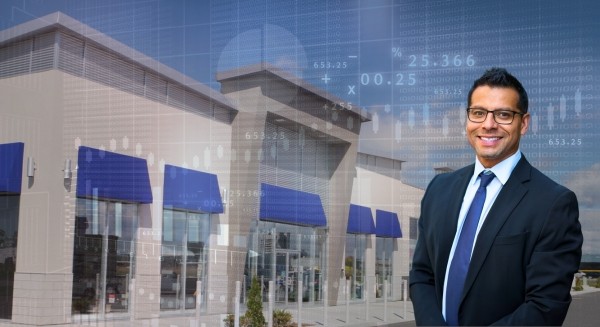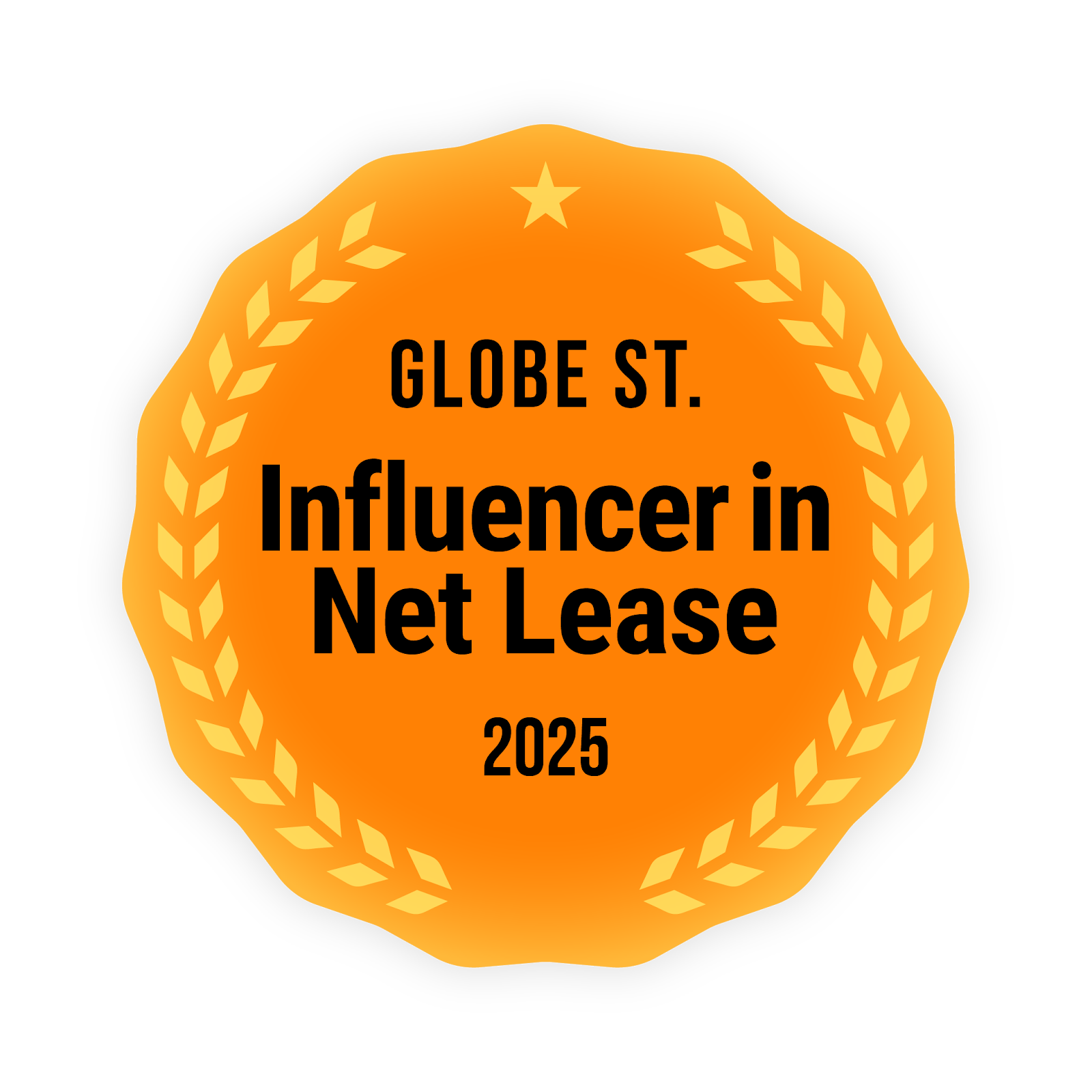The first half of 2025 brought a notable shift in the net lease investment market. After three years of rising cap rates, signs of stabilization are finally beginning to appear. Institutional capital is flowing back into the space with confidence, sector-specific dynamics are sharpening, and transaction strategies are evolving in response to credit quality, macro headwinds, and renewed clarity around rate policy.
This article consolidates key takeaways from multiple expert sources, giving investors a streamlined, authoritative update on what matters most. All external reports and articles are cited and linked for further reading.
Cap rates show signs of stabilizing across property types
Cap rates for single-tenant net lease assets posted only a minimal increase in Q2 2025, suggesting a market beginning to plateau. According to The Boulder Group's Q2 2025 Net Lease Market Report, the overall average cap rate increased by just one basis point to 6.79 percent. Retail rose to 6.57 percent, industrial remained unchanged at 7.23 percent, and office climbed to 7.85 percent, the highest of the three asset types.
This represents a significant cooling compared to the steady increases recorded from 2022 through 2024. This modest increase marks a departure from the sharp upward trajectory seen between 2022 and 2024, indicating that the market may be entering a more stable phase. The shift is attributed to a combination of the Fed's decision to hold rates steady, buyer adaptation to the higher interest rate environment, and improved market liquidity.
Buyers remain focused on credit quality. In Boulder's report, top-tier tenants such as Chick-fil-A (4.45 percent cap), McDonald's (4.38 percent), Chase Bank (4.75 percent), and Wawa (5.75 percent) are still trading well below market averages. Walgreens, in contrast, saw pricing weaken, with average cap rates exceeding 7 percent.
Convenience stores: Expanding, modernizing, and consolidating
The convenience store sector remains one of the most active corners of net lease real estate in 2025. According to B+E's Mid-Year 2025 C-Store Market Report, average cap rates rose by 7 basis points to 5.57 percent, reflecting modest pricing adjustments amid a stable supply of 310 listings.
More than 80 percent of properties on the market have 10 or more years of remaining lease term, and those long-term assets are commanding lower average cap rates of 5.44 percent.
Brand-level breakdowns show ongoing investor demand:
7-Eleven: 119 properties listed (nearly 40 percent of total), with an average cap of 5.26 percent.
Wawa: 29 listings, all but one with 10+ year terms. Average cap rate: 4.74 percent.
Circle K: 39 listings, averaging 5.70 percent.
Murphy USA: Focused on growth through new builds and raze-rebuilds, with a current average cap of 5.13 percent.
Fuel-related tax incentives are also impacting investment behavior. The reinstatement of 100 percent bonus depreciation in January 2025 for qualifying c-store properties has improved the economics for owner-operators and investors looking to modernize and expand.
M&A activity reflects consolidation and strategic reshuffling
While Couche-Tard's high-profile bid for Seven & i Holdings (7-Eleven's parent company) was ultimately withdrawn, the sector saw significant consolidation in H1. According to C-Store Dive, Couche-Tard closed on 270 GetGo and WetGo locations from Giant Eagle, with a concurrent divestiture of 35 locations to satisfy regulatory requirements.
Other notable moves:
Sunoco announced a $9.1 billion acquisition of Parkland Corp.'s U.S., Canadian, and Caribbean retail portfolio.
Smaller operators like Pri Mar Petroleum and Yesway sold off non-core assets.
RaceTrac opened a new 40,000-square-foot distribution hub in Louisiana to support its growing store footprint.
Wawa launched its most significant expansion yet, aiming to open 700 new stores across the Midwest and Southeast over five years.
These moves signal a strategic rebalancing across the industry, with top brands scaling aggressively while shedding underperforming or non-strategic assets.
Subsector breakdown: Credit remains king
As detailed in The Boulder Group's report, the market continues to bifurcate based on tenant credit and lease terms.
Quick Service Restaurants (QSR): Corporate-backed locations remain the most aggressively priced assets. Cap rates for Chick-fil-A (4.45 percent) and McDonald's (4.38 percent) lead the field.
Drugstores: Walgreens saw cap rates climb to 7.75 percent, reflecting investor concern about long-term performance. CVS remained more stable at 6.55 percent.
Dollar Stores: Dollar General and Family Dollar assets with under 5 years of term are now trading above 8 percent cap rates in many cases.
Casual Dining: Olive Garden, Outback, and Red Lobster saw modest compression in cap rates, likely due to stabilized credit and operational consistency.
Investors are increasingly filtering deals by lease term, tenant balance sheet, and sector-specific volatility. Cap rates for assets with 16 to 20 years of lease term remaining are often 150 to 200 basis points tighter than those with five years or less.
Office: Institutional buyers step in, but headwinds remain
Despite an ongoing narrative of distress in the office sector, institutional capital reasserted itself in early 2025. According to Northmarq's research published in Commercial Property Executive, institutional investors accounted for 43 percent of single-tenant office acquisitions in Q1, defying expectations that they would exit the category this year.
Overall, however, the numbers reveal a struggling asset class. Office net lease sales volume dropped 13 percent from Q4 2024 and a staggering 56 percent year-over-year to just $1.8 billion. Cap rates rose for the tenth consecutive quarter, closing Q1 at 7.21 percent. The pace of increase has slowed substantially compared to 2023, suggesting volatility is tapering. Private buyers remain engaged at 31 percent market share, but REITs were absent entirely.
Tenant downsizing, backfill challenges, and a wave of maturing office loans continue to weigh heavily. The sector may need significant repositioning and more lease flexibility to return to favor with long-term investors.
Starwood's $2.2 billion platform play signals institutional conviction
One of the most high-profile deals of the year, Starwood Property Trust's $2.2 billion acquisition of Fundamental Income Properties, offers strong validation for the net lease model. As reported by GlobeSt, the deal includes 467 properties leased to 92 tenants across 44 states, with a 17-year weighted average lease term. Starwood is also acquiring the 28-person operating team, making this a platform acquisition rather than just a real estate buy.
CBRE, as reported by GlobeSt., estimates the U.S. net lease market at $8 trillion. Brookfield, the seller in the transaction, believes the actual number could be closer to $12 trillion. Either way, this confirms net lease is no longer a niche strategy. It is a growing institutional asset class with hybrid debt-equity characteristics that appeal in an uncertain macro environment.
Net lease properties are increasingly viewed as portfolio stabilizers, offering a combination of debt-like security and equity-style upside. Starwood's long-term platform acquisition reflects the appeal of this hybrid profile, providing both predictable income and appreciation potential.
Net Lease is positioned for a more active H2
While volume remains below peak levels, there is growing confidence that the net lease market is entering a more liquid and strategically focused phase. Investors are gravitating toward long-term, credit-secured deals. Institutional participation is intensifying. And the cap rate trajectory, while still elevated, appears to have settled into a more predictable pattern.
Platform acquisitions, policy incentives, and tenant-level differentiators will continue to shape the remainder of the year.
Looking to track the market's best listings and comps in one place?
Sign in or create your account at Net-Trade.com to get started




